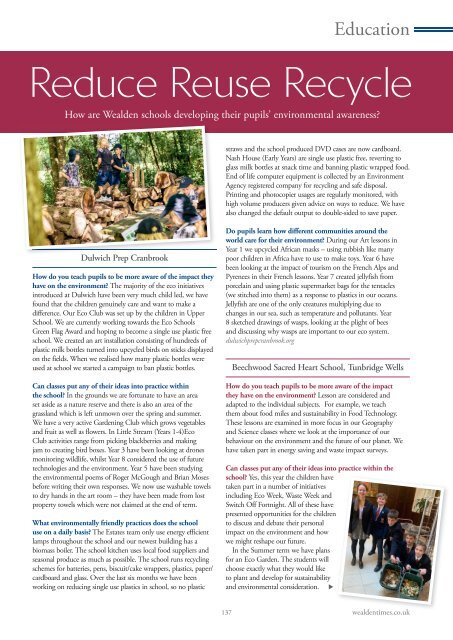Wealden Times | WT207 | May 2019 | Extensions & Outdoor Living supplement inside
Wealden Times - The lifestyle magazine for the Weald
Wealden Times - The lifestyle magazine for the Weald
You also want an ePaper? Increase the reach of your titles
YUMPU automatically turns print PDFs into web optimized ePapers that Google loves.
Education<br />
Reduce Reuse Recycle<br />
How are <strong>Wealden</strong> schools developing their pupils’ environmental awareness?<br />
straws and the school produced DVD cases are now cardboard.<br />
Nash House (Early Years) are single use plastic free, reverting to<br />
glass milk bottles at snack time and banning plastic wrapped food.<br />
End of life computer equipment is collected by an Environment<br />
Agency registered company for recycling and safe disposal.<br />
Printing and photocopier usages are regularly monitored, with<br />
high volume producers given advice on ways to reduce. We have<br />
also changed the default output to double-sided to save paper.<br />
Dulwich Prep Cranbrook<br />
How do you teach pupils to be more aware of the impact they<br />
have on the environment? The majority of the eco initiatives<br />
introduced at Dulwich have been very much child led, we have<br />
found that the children genuinely care and want to make a<br />
difference. Our Eco Club was set up by the children in Upper<br />
School. We are currently working towards the Eco Schools<br />
Green Flag Award and hoping to become a single use plastic free<br />
school. We created an art installation consisting of hundreds of<br />
plastic milk bottles turned into upcycled birds on sticks displayed<br />
on the fields. When we realised how many plastic bottles were<br />
used at school we started a campaign to ban plastic bottles.<br />
Can classes put any of their ideas into practice within<br />
the school? In the grounds we are fortunate to have an area<br />
set aside as a nature reserve and there is also an area of the<br />
grassland which is left unmown over the spring and summer.<br />
We have a very active Gardening Club which grows vegetables<br />
and fruit as well as flowers. In Little Stream (Years 1-4) Eco<br />
Club activities range from picking blackberries and making<br />
jam to creating bird boxes. Year 3 have been looking at drones<br />
monitoring wildlife, whilst Year 8 considered the use of future<br />
technologies and the environment. Year 5 have been studying<br />
the environmental poems of Roger McGough and Brian Moses<br />
before writing their own responses. We now use washable towels<br />
to dry hands in the art room – they have been made from lost<br />
property towels which were not claimed at the end of term.<br />
What environmentally friendly practices does the school<br />
use on a daily basis? The Estates team only use energy efficient<br />
lamps throughout the school and our newest building has a<br />
biomass boiler. The school kitchen uses local food suppliers and<br />
seasonal produce as much as possible. The school runs recycling<br />
schemes for batteries, pens, biscuit/cake wrappers, plastics, paper/<br />
cardboard and glass. Over the last six months we have been<br />
working on reducing single use plastics in school, so no plastic<br />
Do pupils learn how different communities around the<br />
world care for their environment? During our Art lessons in<br />
Year 1 we upcycled African masks – using rubbish like many<br />
poor children in Africa have to use to make toys. Year 6 have<br />
been looking at the impact of tourism on the French Alps and<br />
Pyrenees in their French lessons. Year 7 created jellyfish from<br />
porcelain and using plastic supermarket bags for the tentacles<br />
(we stitched into them) as a response to plastics in our oceans.<br />
Jellyfish are one of the only creatures multiplying due to<br />
changes in our sea, such as temperature and pollutants. Year<br />
8 sketched drawings of wasps, looking at the plight of bees<br />
and discussing why wasps are important to our eco system.<br />
dulwichprepcranbrook.org<br />
Beechwood Sacred Heart School, Tunbridge Wells<br />
How do you teach pupils to be more aware of the impact<br />
they have on the environment? Lesson are considered and<br />
adapted to the individual subjects. For example, we teach<br />
them about food miles and sustainability in Food Technology.<br />
These lessons are examined in more focus in our Geography<br />
and Science classes where we look at the importance of our<br />
behaviour on the environment and the future of our planet. We<br />
have taken part in energy saving and waste impact surveys.<br />
Can classes put any of their ideas into practice within the<br />
school? Yes, this year the children have<br />
taken part in a number of initiatives<br />
including Eco Week, Waste Week and<br />
Switch Off Fortnight. All of these have<br />
presented opportunities for the children<br />
to discuss and debate their personal<br />
impact on the environment and how<br />
we might reshape our future.<br />
In the Summer term we have plans<br />
for an Eco Garden. The students will<br />
choose exactly what they would like<br />
to plant and develop for sustainability<br />
and environmental consideration. <br />
137 wealdentimes.co.uk


















